We are grateful to Oli, and his mum Claire, who worked with us in November 2021 to share his story here. Sadly, he passed away in August 2023. We remember Oli as we continue our work to raise awareness of this devastating disease and to fund research to help find a cure. He will be forever in our hearts.
Fifteen-year-old Oli Ross, from Ashford, Kent, had experienced no symptoms before his headaches started in July this year. At the time, his whole family had come down with a virus and also had headaches so no one was overly concerned. However, when they recovered and Oli still hadn’t, his mum took him to A&E where he was evaluated and sent home. Overnight his right eye started to wander and a scan was finally carried out, which is when it was discovered Oli had a brain tumour. A biopsy taken a week later revealed he had a high-grade, incurable tumour. Having now finished a six-week course of radiotherapy and chemotherapy, Oli’s family is crowdfunding to enable him to access specialist treatment in Germany.
Here is Oli’s story as told by his mum, Claire Ross-Duffield …
Oli had no symptoms; he was absolutely fine up until July when he had headaches for about two weeks, but we all had headaches so we didn’t bat an eyelid. Me, his stepdad, Kevin, and his 13-year-old sister, Georgia, had all caught some sort of virus and had headaches for about a week. It wasn’t until we got better and Oli continued having them that I got a bit concerned, even though they weren’t that bad – he’d pop a coupl of paracetamols and feel fine.
On day 11, I woke up with the sense that something was wrong so I took Oli to A&E at William Harvey Hospital, in Ashford. After nine hours of being passed from pillar to post, I burst into tears. I know they must have had lots of people coming in every day with a headache but I was very frustrated because I’m not one of those parents, I’d never brought either of my kids to A&E before. They did check him over, but then they sent him away, saying it was probably a virus. I knew Oli didn’t have a virus because he didn’t have a temperature or any sickness, it was just the headaches. A junior doctor who looked in Oli’s eyes said there was some sort of swelling behind his right one, but then a consultant came in, gave him a full evaluation and said ‘no, he’s fine, go home and bring him back in seven days if he’s still having problems’.
“That set alarm bells off in my head, which is why when I went home, I said to Kev that something wasn’t right.”
Overnight, Oli’s right eye started wandering on its own. He wasn’t able to look at us straight and that’s when I got into a massive panic. I’d seen things on Facebook about that so I knew it was bad. Kev took Oli back to A&E and said he wasn’t going anywhere until they’d at least given Oli a scan, so they gave him one to put our minds at rest but they wouldn’t talk to Kev about it because he’s Oli’s stepdad, so he phoned and told me to come down. It was just the most horrible thing ever. The hospital’s only about five minutes away but getting there felt like a lifetime, especially knowing what I did in the pit of my stomach; I’d already convinced myself what it was. In a way that made it easier but it also made it scarier because I knew how bad it was.
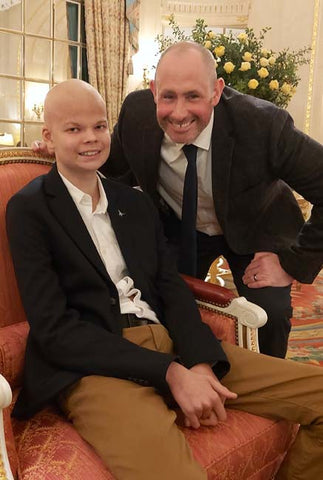
“There was no doubt in my mind what they were going to say to me.”
When I arrived, Kev met me and three doctors came over and asked me to go into a side room with them. The words ‘side room’ will never leave me. I knew the second they wanted me to go somewhere else that everything was going to change, and it did. They said ‘we’ve found something – it’s a lesion on his brain’ and at that point I broke down massively. I’ve got PTSD from that moment; it was just horrific. They said he needed to go to King’s College Hospital, in London, to have a more in-depth MRI to say exactly what it was. It was awful but they were lovely.
“They were holding my hand whilst I sat there in absolute shock, crying my eyes out.”
Meanwhile, Oli was on the ward on his own, which was killing me, so one of the nurses went to get him and his face when he walked in told me that he knew. One of the doctors told him they’d found something on his scan and all he asked was ‘is it cancer?’ and ‘am I going to die?’. They said they wouldn’t know anything else until he went to King’s. I gave him a hug and then left him with Kev whilst I went off with my best friend, who works on another ward at the hospital, to try and pull myself together.
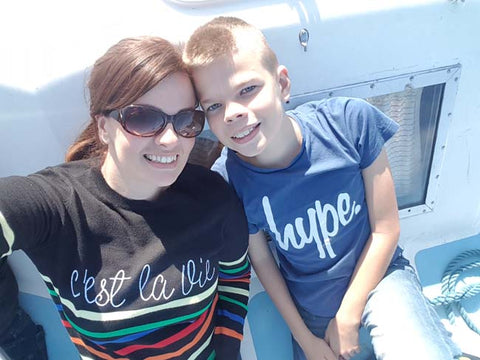
By then it was about 3pm and an ambulance was due to take us to King’s at 7pm but we ended up having to wait until 3am. We sat there waiting, knowing that he had something wrong with him. It was an agonising wait and, because of COVID, we were told Kev wasn’t allowed to go with us in the ambulance. I was in such a state and kept saying ‘I can’t go to the hospital on my own, you have to come with me’. I was getting so upset that one of Kev’s colleagues offered to blue light him up there behind us, but in the end, he was allowed in with us.
“At King’s, the neurology team came down to show us the scan and it was awful, the tumour looked huge and it just hit me all over again.”
They said Oli needed an operation and that, afterwards, they’d be able to test the tumour to find out what it was. I said ‘that’s fine, just get it out’ but, because of where it was, they needed a week to plan it. Thankfully, they let us stay there for the week, partly to keep an eye on him but also because we live so far away from the hospital.
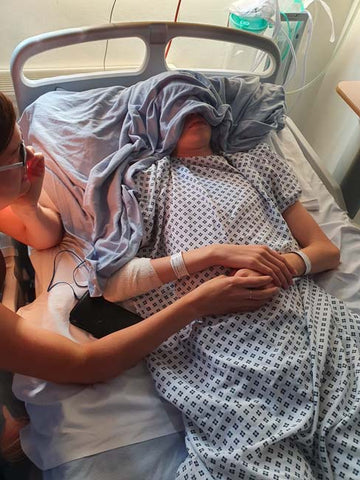
“Whilst we were there, the right side of Oli’s body went numb.”
His mouth went numb first and then over the week he progressively lost more feeling on his right-hand side, so they decided to bring the operation forward a day. He was only allowed one person to take him down to theatre and he didn’t want to have to choose between me and his dad, Dean, so he made us play drafts to decide, which is so Oli. They managed to remove three quarters of his tumour during a 10-hour operation, after which he was taken to intensive care. I remember having to sign a form telling me he could lose his vision, his movement, even his memory – it was terrifying.
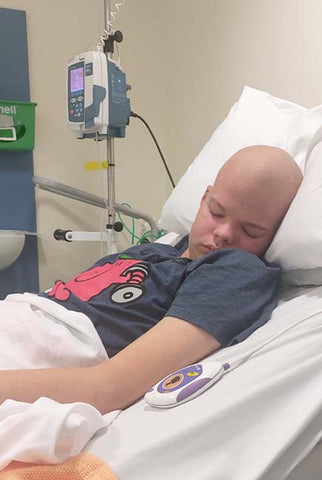
“During his operation I started Googling brain tumours, which isn’t something I’d recommend anyone does.”
I kept thinking that I was right about him being ill, I was right about it being a brain tumour and I’m going to be right about it being the worst type. He spent one night on the high dependency ward, then he was back on the general ward for four nights before being sent home. He spent two weeks recuperating, but after a couple of days sleeping, he was back to his normal self. He was eating, drinking, laughing, having friends round and being happy.
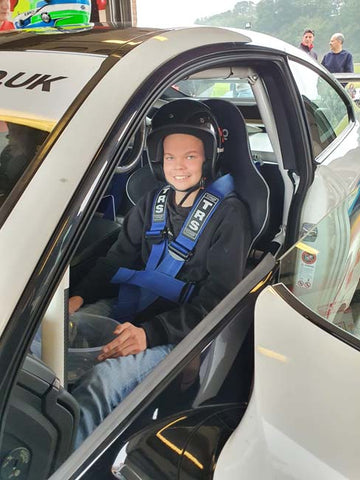
We had to wait six weeks for his scar to heal before being able to start any other treatment so we spent the time doing lots of stuff around Kent, where we live. We stayed in a bubble tent, on an alpaca lodge, in a five-star hotel up the road from us and we went to lots of restaurants because Oli is a big foodie. He has a grown-up palette and loves fillet steaks, mussels, fancy cheeses, stuff like that. We spent a lot of money but it was worth it.
Then the day before we were due home we got a call from the Royal Marsden Hospital, in Sutton, telling us what type of tumour he has – grade 4, incurable and aggressive. I had to walk away from the children to take the call and I burst into tears as my mind immediately started racing. That’s when they told us Oli would need to undergo six weeks of radiotherapy and chemotherapy and then five days of chemo every month for a year. I knew then that we needed more treatment options and had to take myself for a walk to compose myself as the thought of Oli seeing my reaction terrified me. When he was first in the hospital, he told me ‘I can tell how serious something is just by the look on your face’.
“He’s just finished those six weeks of combined radio and chemo and did really well.”
For the first five weeks he lost his sense of taste and that was devastating to him because he loves food and went right off it and lost quite a bit of weight. He also had a few days of sickness and got admitted to the hospital overnight because of it, but now we’re at the fatigue stage so he’s just very tired. We went to Center Parcs for the weekend, which he usually loves, but he slept the whole time, although he did say he enjoyed the change of scenery. My parents, Wendy and David, stayed with him in the lodge and I got to have some quality time with Georgia. She and Oli are exceptionally close and she’s just had to carry on as normal knowing what’s going on so it gave her chance to ask me lots of questions, which she really needed.

We’ve now got a bit of a break until 12 November when he’ll have a scan to see if the chemo and radiotherapy has had any effect. His oncologist at the Marsden told us that’s Oli’s only treatment plan, there’s nothing else available to him here. It’s just horrible because I feel, as a mum, I should go to the doctors and they should say ‘this is what we’re going to do to make him better’.
“Sadly, it’s not like that with brain tumours, they throw what they can at it but then that’s it.”
That’s when I found Brain Tumour Research and its Facebook page where others talked about privately funding advanced treatment in Germany, which is why my friend set up a GoFundMe page for us. We’ve raised £36,000 so far and have been able to send Oli’s bloods and the last part of the tumour they removed during his operation to Germany, where they’ll use it for sequencing. Then, in about four to six weeks, they’ll tell us what they can offer Oli, whether it’s immunotherapy vaccines or repurposed drugs. It doesn’t seem fair that we’re left scouring the internet and frantically fundraising to pay for our own bespoke treatment for Oli to stand even a chance of survival, but that’s the position we find ourselves in and we need hope so we’re willing to do whatever it takes.
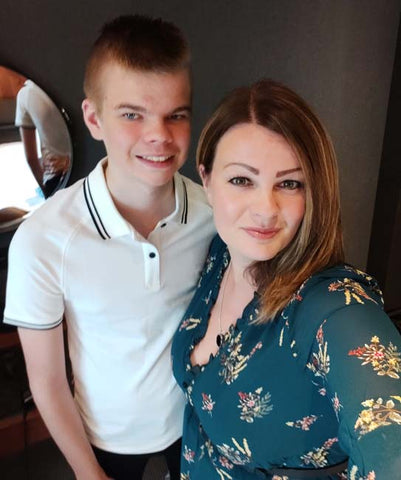
“Until we hear back from Germany, we’re just going to take it day by day and fit in fun things where we can.”
Oli said he felt like he’d wasted six weeks of his summer holidays in hospital so we asked him to write a wish list of things he would like to do and we’ve started ticking them off, things like going to his first Chelsea football match and to a KSI concert. He’s a massive Sidemen fan and managed to get their autographs and bump into Simon, the Miniminter YouTube personality, so he was very happy with that.
Claire Ross-Duffield
November 2021
Brain tumours are indiscriminate; they can affect anyone at any age. What’s more, they kill more children and adults under the age of 40 than any other cancer... yet just 1% of the national spend on cancer research has been allocated to this devastating disease.
Brain Tumour Research is determined to change this.
If you have been inspired by Oli’s story you may like to make a donation via www.braintumourresearch.org/donate or leave a gift in your will via www.braintumourresearch.org/legacy
Together we will find a cure

